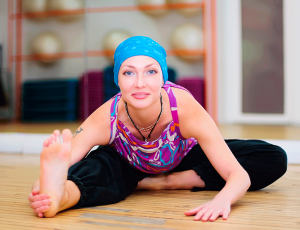Improve Lymphedema Symptoms Among Breast Cancer Survivors with Yoga Therapy
By John M. de Castro, Ph.D.
“Research in breast cancer patients has shown that yoga may be able to help: improve physical functioning, reduce fatigue, reduce stress, improve sleep, improve quality of life.” – Vicki Flannery
Because of great advances in treatment, many patients today are surviving cancer. But cancer survivors frequently suffer from a range of persistent psychological and physical residual symptoms that impair their quality of life. A common side effect of cancer treatment is breast cancer-related lymphedema. It “comprises of a set of pathological conditions, in which protein-rich fluid accumulates in soft tissues because of lymphatic flow interruption. BCRL is an agglomeration of symptoms such as swelling of arm, decreased physical functioning and body motion, altered sensation in limbs, and fatigue accompanied by psychological stress.” A safe and effective treatments for Lymphedema is needed.
Mindfulness training and exercise have been shown to help with general cancer recovery. Mindfulness practices have been shown to improve the residual symptoms in cancer survivors. Yoga is both an exercise and a mindfulness practice that has also been shown to be helpful with the residual symptoms in cancer survivors, the psychological and physical ability to deal with cancer treatment and improves sleep. The research on yoga practice as a treatment for patients recovering from breast cancer with Lymphedema has been accumulating. It is thus reasonable to take a step back and summarize what has been learned.
In today’s Research News article “Managing Lymphedema, Increasing Range of Motion, and Quality of Life through Yoga Therapy among Breast Cancer Survivors: A Systematic Review.” (See summary below or view the full text of the study at: https://www.ncbi.nlm.nih.gov/pmc/articles/PMC8023442/ ) Saraswathi and colleagues review and summarize the published research of the effects of yoga practice on the Lymphedema with breast cancer survivors. They identified 7 published studies.
They report that the published studies used a variety of yoga styles and found that yoga therapy was safe and produced positive benefits for the symptoms of Lymphedema with breast cancer survivors. In particular, there were significant improvements in the patients’ quality of life, range of motion, musculoskeletal symptoms, and survival. This suggests that yoga therapy is a safe and effective means of reducing the suffering of these cancer survivors. The authors note, though, that the studies were in general small and a large randomized control trial with an active control condition is needed.
So, improve lymphedema symptoms among breast cancer survivors with yoga therapy.
“When you’re in recovery or treatment for breast cancer, the medication and treatments come with many side effects that can take an unwanted toll on your body and spirit. . . One such therapy has already been proven to help breast cancer survivors and patients — yoga.” – Rocky Mountain Cancer Center
CMCS – Center for Mindfulness and Contemplative Studies
This and other Contemplative Studies posts are also available on Google+ https://plus.google.com/106784388191201299496/posts and on Twitter @MindfulResearch
Study Summary
Saraswathi, V., Latha, S., Niraimathi, K., & Vidhubala, E. (2021). Managing Lymphedema, Increasing Range of Motion, and Quality of Life through Yoga Therapy among Breast Cancer Survivors: A Systematic Review. International journal of yoga, 14(1), 3–17. https://doi.org/10.4103/ijoy.IJOY_73_19
Abstract
Lymphedema is a common complication of breast cancer treatment. Yoga is a nonconventional and noninvasive intervention that is reported to show beneficial effects in patients with breast cancer-related lymphedema (BCRL). This study attempted to systematically review the effect of yoga therapy on managing lymphedema, increasing the range of motion (ROM), and quality of life (QOL) among breast cancer survivors. The review search included studies from electronic bibliographic databases, namely Medline (PubMed), Embase, and Google Scholar till June 2019. Studies which assessed the outcome variables such as QOL and management of lymphedema or related physical symptoms as effect of yoga intervention were considered for review. Two authors individually reviewed, selected according to Cochrane guidelines, and extracted the articles using Covidence software. Screening process of this review resulted in a total of seven studies. The different styles of yoga employed in the studies were Iyengar yoga (n = 2), Satyananda yoga (n = 2), Hatha yoga (n = 2), and Ashtanga yoga (n = 1). The length of intervention and post intervention analysis ranged from 8 weeks to 12 months. Four studies included home practice sessions. QOL, ROM, and musculoskeletal symptoms showed improvement in all the studies. Yoga could be a safe and feasible exercise intervention for BCRL patients. Evidence generated from these studies was of moderate strength. Further long-term clinical trials with large sample size are essential for the development and standardization of yoga intervention guidelines for BCRL patients.
https://www.ncbi.nlm.nih.gov/pmc/articles/PMC8023442/
